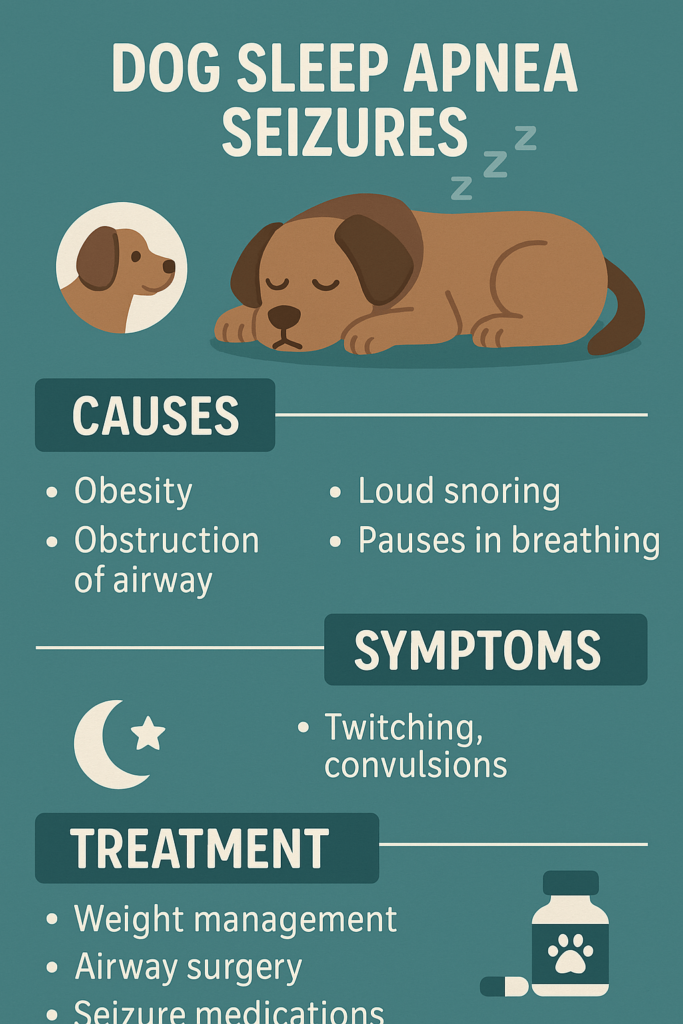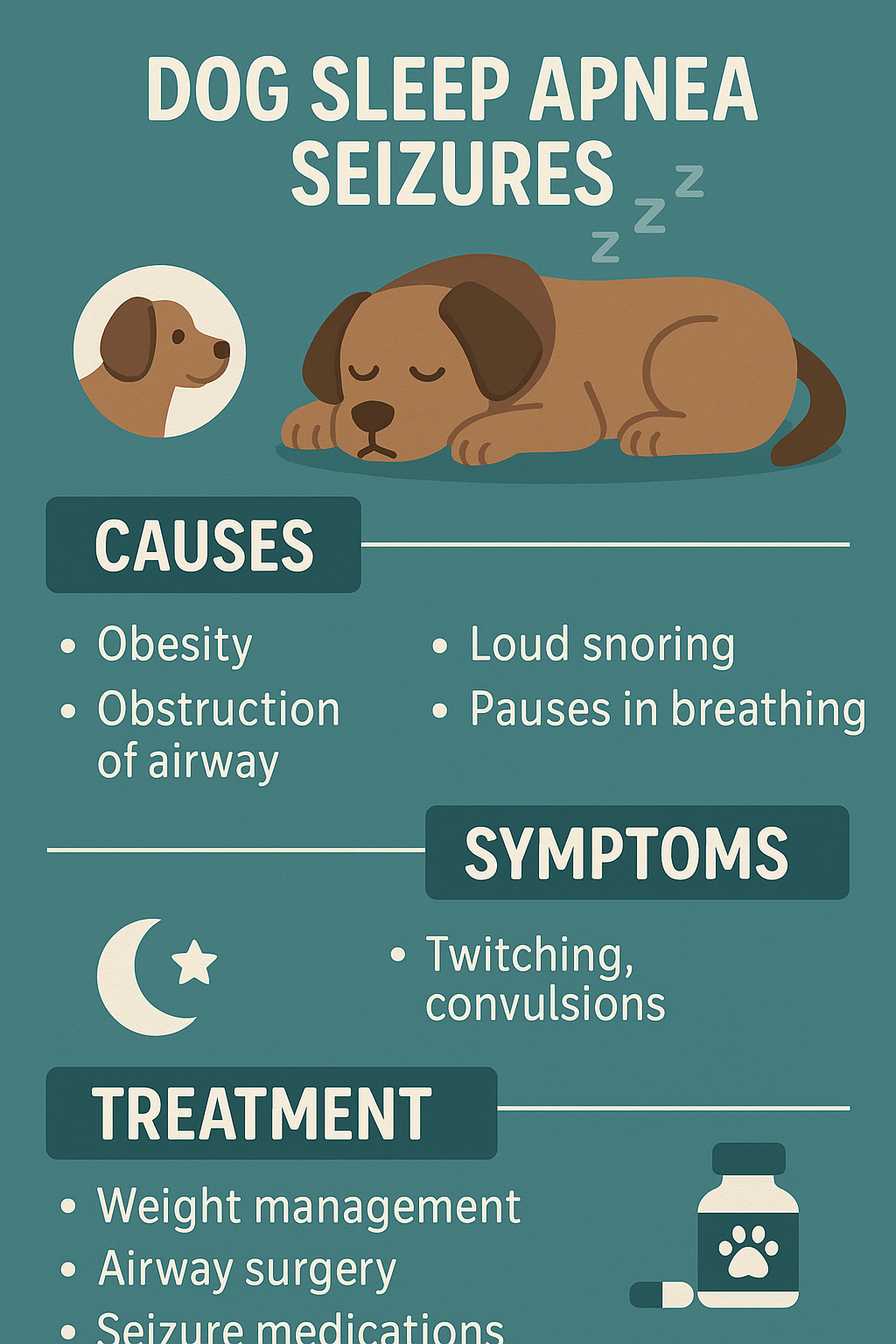Dog Sleep Apnea and Seizures: What Every Pet Owner Should Know
Sleep is essential for your dog’s health, but what happens when their rest is disrupted by conditions like sleep apnea or seizures? These disorders can significantly impact your dog’s quality of life, leaving pet owners worried and unsure of how to help. Sleep apnea, a condition where breathing repeatedly stops and starts during sleep, and seizures, sudden bursts of abnormal electrical activity in the brain, may seem unrelated at first glance.
However, both can affect your dog’s sleep patterns and overall well-being. Understanding the signs, causes, and treatment options for these conditions is crucial for ensuring your furry friend gets the rest they need. Let’s dive into everything you need to know about dog sleep apnea and seizures to keep your pet healthy and happy.
Sleep Apnea in Dogs: Expert Insight
“Sleep apnea is a sleep disorder in which breathing stops and restarts during sleep. This potentially serious disorder affects anywhere between 10% and 30% of adults, but can our canine counterparts also suffer from it?”
Signs Your Dog May Have Sleep Apnea or Seizures
Recognizing the symptoms of sleep apnea or seizures is the first step toward helping your dog. Both conditions present unique signs that require careful observation.
Loud Snoring or Gasping for Air:
Dogs with sleep apnea often snore loudly or wake up gasping for air due to interrupted breathing during sleep.Excessive Daytime Sleepiness:
If your dog seems unusually tired or lethargic during the day, it could indicate poor-quality sleep caused by sleep apnea.Sudden Collapse or Stiffening:
Seizures may cause your dog to collapse, stiffen, or exhibit uncontrollable muscle movements.Unusual Vocalizations:
Whining, barking, or growling during sleep could be a sign of either sleep apnea or seizure activity.Changes in Behavior:
Increased irritability, confusion, or disorientation may signal underlying issues affecting your dog’s sleep.
By paying attention to these signs, you can identify potential problems early and seek professional guidance to address them effectively.

Causes of Sleep Apnea and Seizures in Dogs
Understanding the root causes of sleep apnea and seizures can help you take preventive measures and manage your dog’s condition more effectively.
Obesity and Weight Gain:
Excess weight can narrow your dog’s airways, increasing the risk of sleep apnea. Maintaining a healthy weight is key to prevention.Brachycephalic Breeds:
Flat-faced breeds like Bulldogs and Pugs are more prone to sleep apnea due to their anatomical structure.Genetic Predisposition:
Some dogs are genetically predisposed to seizures, particularly certain breeds like Beagles or Border Collies.Trauma or Brain Injury:
Head injuries or trauma can trigger seizures by disrupting normal brain function.Underlying Health Conditions:
Conditions like hypothyroidism, infections, or tumors may contribute to both sleep apnea and seizures.
Addressing these causes through proper care and veterinary intervention can improve your dog’s health and reduce the likelihood of complications.
Check this guide 👉Where Should a Dog Sleep? Best 7 Expert Tips!
Check this guide 👉Why Does My Dog Sleep with Eyes Open? Best 7 Expert Tips!
Check this guide 👉Why Does My Dog Sleep Under My Bed? Best 7 Expert Tips!
Symptoms of Sleep Apnea | Symptoms of Seizures |
|---|---|
Loud snoring or gasping for air | Sudden collapse or stiffening |
Interrupted breathing during sleep | Uncontrollable muscle twitching |
Excessive daytime sleepiness | Loss of consciousness |
Restlessness or frequent waking | Biting or chewing motions during sleep |
Irritability or mood changes | Confusion after episodes |
Treatment Options for Sleep Apnea and Seizures
While sleep apnea and seizures can be concerning, there are effective treatments available to manage these conditions and improve your dog’s quality of life.
Weight Management Programs:
For sleep apnea, reducing your dog’s weight through diet and exercise can alleviate airway obstruction.Surgical Interventions:
In severe cases of sleep apnea, surgery may be necessary to correct structural issues in the airway.Medications for Seizures:
Anti-seizure medications like phenobarbital or potassium bromide can help control seizure frequency and severity.Behavioral Modifications:
Creating a calm and stress-free environment can reduce seizure triggers and promote better sleep.Regular Veterinary Check-Ups:
Monitoring your dog’s condition through routine vet visits ensures timely adjustments to treatment plans.
With the right approach, these treatments can make a significant difference in managing your dog’s symptoms and improving their overall well-being.
Tips for Supporting Your Dog’s Sleep Health
Promoting healthy sleep habits is essential for preventing and managing sleep-related issues like sleep apnea and seizures. These tips can help ensure your dog gets the rest they need.
Provide a Comfortable Sleeping Area:
Ensure your dog has a cozy, quiet space to sleep free from distractions or disturbances.Establish a Consistent Routine:
A regular sleep schedule helps regulate your dog’s internal clock and promotes restful sleep.Encourage Physical Activity:
Daily exercise reduces stress and helps your dog expend energy, making it easier for them to settle down at night.Monitor Their Diet:
Avoid feeding your dog heavy meals close to bedtime, as this can disrupt digestion and sleep.Minimize Stress Triggers:
Identify and eliminate factors that cause anxiety or overstimulation before bedtime.
By implementing these strategies, you can create an environment that supports your dog’s sleep and overall health.
Preventive Measures for Sleep Apnea
Preventing sleep apnea in dogs involves proactive steps to reduce risk factors and promote respiratory health. These measures can help safeguard your dog’s sleep quality.
Maintain a Healthy Weight:
Obesity is a leading cause of sleep apnea; keeping your dog lean reduces pressure on their airways.Avoid Sedatives Before Bed:
Certain medications can relax throat muscles too much, worsening breathing difficulties during sleep.Use Elevated Food Bowls:
Feeding your dog from an elevated bowl can reduce strain on their airways, especially for brachycephalic breeds.Limit Exposure to Allergens:
Dust, pollen, and smoke can irritate your dog’s respiratory system, exacerbating sleep apnea symptoms.Schedule Regular Vet Visits:
Early detection of potential issues allows for timely interventions and better outcomes.
Taking these preventive steps can significantly lower your dog’s risk of developing sleep apnea.
Understanding Different Types of Seizures
Seizures in dogs come in various forms, each with distinct characteristics. Knowing the differences helps you respond appropriately and seek the right treatment.
Generalized Seizures:
These involve the entire body, causing convulsions, loss of consciousness, and paddling motions.Focal Seizures:
Limited to one part of the body, focal seizures may manifest as twitching or unusual behavior in specific areas.Cluster Seizures:
Multiple seizures occurring within a short timeframe require immediate veterinary attention.Psychomotor Seizures:
These involve sudden behavioral changes, such as chasing imaginary objects or biting the air.Status Epilepticus:
A life-threatening condition where a seizure lasts longer than five minutes or occurs repeatedly without recovery.
Understanding these types ensures you’re prepared to act quickly and effectively during a seizure episode.
Coping Strategies for Pet Owners
Managing a dog with sleep apnea or seizures can be emotionally taxing for pet owners. These coping strategies can help you navigate the challenges with resilience and compassion.
Educate Yourself About the Conditions:
Knowledge empowers you to make informed decisions and advocate for your dog’s care.Join Support Groups:
Connecting with other pet owners facing similar challenges provides emotional support and practical advice.Practice Self-Care:
Caring for a dog with health issues can be stressful; prioritize your own well-being to stay strong for your pet.Keep a Symptom Journal:
Documenting your dog’s episodes helps veterinarians identify patterns and tailor treatment plans.Celebrate Small Wins:
Acknowledge progress, no matter how small, to maintain a positive outlook and strengthen your bond with your dog.
By adopting these strategies, you can create a supportive environment for both you and your furry companion.
Frequently Asked Questions About Dog Sleep Apnea and Seizures
Can sleep apnea lead to seizures in dogs?
While sleep apnea itself doesn’t directly cause seizures, chronic lack of oxygen due to apnea may increase seizure risk in some cases.
Are certain dog breeds more prone to sleep apnea?
Yes, brachycephalic breeds like Bulldogs, Pugs, and Shih Tzus are more susceptible due to their shortened airways.
What should I do if my dog has a seizure?
Stay calm, move objects away from your dog to prevent injury, and contact your veterinarian immediately.
Can sleep apnea be cured?
Treatment varies depending on the cause; while weight loss or surgery can resolve some cases, others may require ongoing management.
How can I tell if my dog’s snoring is normal?
Occasional snoring is usually harmless, but persistent or loud snoring accompanied by other symptoms warrants a vet visit.
Empowering Your Dog to Thrive Despite Sleep Challenges
Sleep apnea and seizures can be daunting challenges for both dogs and their owners, but with knowledge, care, and professional support, these conditions can be managed effectively. By recognizing the signs, addressing the underlying causes, and implementing practical solutions, you can ensure your dog enjoys restful nights and energetic days. Remember, your veterinarian is your greatest ally in navigating these issues—don’t hesitate to reach out for advice tailored to your dog’s unique needs. With patience and dedication, you can give your beloved companion the gift of peaceful, rejuvenating sleep.
Natural Antioxidants for Cats: Best 7 Expert Tips! – Discover how antioxidants boost your cat’s health, support longevity, and protect against oxidative stress naturally.
Can Dogs Be Lactose Intolerant? Best 7 Expert Tips! – Discover symptoms, safe alternatives, and how to manage lactose intolerance in dogs effectively.
Natural Antioxidants for Dogs: Best 7 Expert Tips! – Discover how antioxidants boost immunity, fight aging, and keep your dog healthy naturally.
Long-Term Effects of a Cat Eating Chocolate: Best 7 Tips! – Learn the risks, symptoms, and how to protect your cat from lasting health issues.





